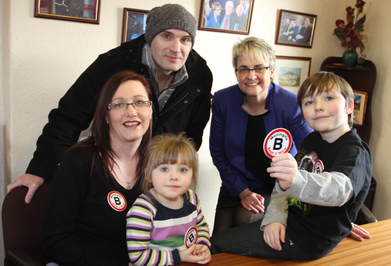Meningitis B can be a killer. It respects no age, especially the very young.
A year after introducing the lifesaving Men B vaccine, millions of young children remain at risk from this devastating disease.
On Tuesday 1 September 2015, the UK became the first country in the world to introduce the revolutionary new meningococcal group B (Men B) vaccine, Bexsero, to under 1’s through the NHS.

Despite this, more than one child a month may have contracted the deadly Men B infection and up to five children may have needlessly died. Many of those who have contracted Men B will be living with life-changing after-effects.
Had the decision been made by the Government to vaccinate all under 5’s, these tragedies could have been avoided.
Parents like Jenny Burdett, whose daughter Faye’s death sparked an unprecedented 823,346 signatures to a UK-wide petition, have renewed calls for the vaccine to be made available to all young children at risk.
Jenny said: “As a family who has been through the devastation of meningitis, we feel that all children should be protected from this cruel disease that took our daughter. It’s not just about Faye’s death but also about the maiming of children that survive the disease; it is life changing for a child and their family. Prevention must be better.”
Until the decision is made to extend the age range of the vaccine, an estimated 2.1 million*2 children under 5 remain at risk from Men B. Meningitis continues to kill more children under five than any other infectious disease.
Meningitis Now Chief Executive, Liz Brown, said: “The introduction of the Men B vaccine was a milestone in the prevention of this killer disease – it’s such a shame that the Government didn’t have the courage to go that extra step and protect all children most at risk.
“The recent decision by the JCVI, not to vaccinate children up to the age of 2 years, due to vaccine shortages, exacerbates the need for the government to take action.
“We call upon Secretary of State for Health; Jeremy Hunt to mark today’s anniversary by taking that extra step now and introduce the vaccine for all of the nation’s children up to the age of 5.”
Meningitis Now is collecting signatures to add to a letter to the Secretary of State for Health, Jeremy Hunt, as part of its’ ‘Give Children A Voice’ campaign. The letter will be presented in Westminster by a child who has missed out on the vaccine in the coming weeks. To add your name visit:
www.meningitisnow.org/how-we-help/campaigns/give-children-voice
For more information on the Men B vaccine, as well as the signs and symptoms of meningitis, visit:
*1 Public Health England Health Protection Report Vol 9 23 October 2015 shows 139 cases of Men B in infants aged 1-4 years. The incidence of death is in this group is 4%.
*2 Based on an annual UK birth-rate of 700,000.
Meningitis and Septicaemia Facts
* Meningitis is usually caused by bacteria or viruses
* Meningitis is inflammation of the membranes that surround and protect the brain and spinal cord
* Septicaemia is blood poisoning
* Some bacteria that cause meningitis also cause septicaemia
* Meningitis and septicaemia often happen together – it is vital to know all the signs and symptoms
* The early signs and symptoms of meningitis and septicaemia can be similar to ‘flu and include fever, headache, nausea, vomiting and muscle pain.
* The more specific signs and symptoms include fever with cold hands and feet, drowsiness, confusion, pale blotchy skin, stiff neck, dislike of bright lights and a rash which doesn’t fade under pressure.
* In babies, symptoms can also include being floppy and unresponsive, dislike of being handled, rapid breathing, an unusual, moaning cry and a bulging fontanelle (soft spot on the top of the head).
* There are an estimated 3,200 cases of bacterial meningitis and septicaemia each year in the UK.
* Following bacterial meningitis or septicaemia, one in ten people will die and at least a third of survivors will be left with lifelong after-effects such as hearing loss, epilepsy, limb loss or learning difficulties
* Meningitis and septicaemia can affect anyone, of any age, at any time. However, babies and young children are most at risk, and young people between 15 – 24 years are also a higher risk group.
* In the past 20 years, effective vaccines have been developed to give protection against SOME types of meningitis. These are offered to all babies and young children as part of the UK childhood immunisation programme. BUT there are not vaccines to protect against ALL types.
* A vaccine to protect against meningococcal group B (Men B) disease, the most common cause of bacterial meningitis and septicaemia, was introduced into the UK childhood immunisation programme for newborn babies in September 2015.
* If you suspect someone may be ill with meningitis or septicaemia, trust your instincts and get immediate medical help.
For more information visit:
Freephone helpline 0808 80 10 388.
About Meningitis Now
Meningitis Now is the founder of the meningitis movement and the only charity dedicated to fighting meningitis in the UK
With 30 years’ experience, we are working towards a future where no one in the UK loses their life to meningitis and everyone affected gets the support they need to rebuild their lives.
Meningitis Now fights the disease on all fronts:
* Providing a powerful, united voice for people fighting meningitis.
* Saving lives by funding vaccine and preventative research.
* Reducing the disease’s impact through awareness.
* Rebuilding futures with dedicated support.
* Fundraising to deliver our plans.
























